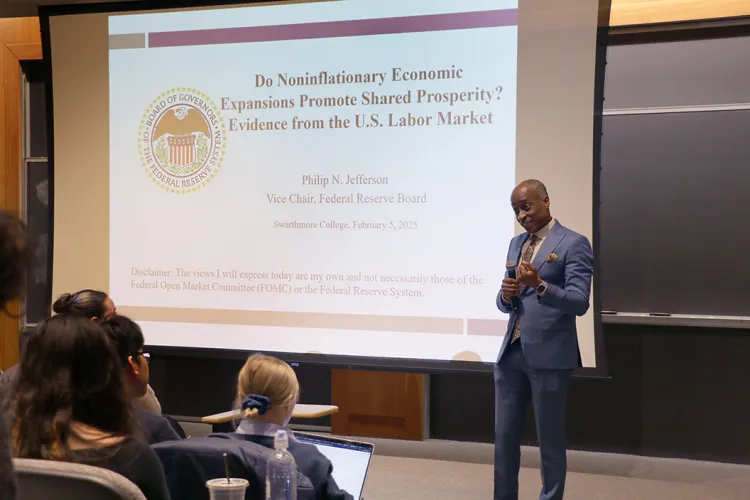Federal Reserve Vice Chair Philip N. Jefferson Returns to Campus to Discuss Economic Expansion and Shared Prosperity

Hosted by the Economics Department primarily for Economics 101 students, the event with Jefferson delved into non-inflationary economic expansions, or periods of economic growth without inflation.
Federal Reserve Vice Chair Philip N. Jefferson, former Centennial Professor of Economics at Swarthmore, returned to the College to lead a conversation on the economy on Wednesday, Feb. 5. He delivered his lecture, “Do Non-Inflationary Economic Expansions Promote Shared Prosperity?”, to a standing-room-only crowd in the Science Center.
Jefferson opened his talk with an acknowledgement of his strong connection to the College.
“This is a special community, and it brings back very fond memories of fantastic students, great colleagues, and pedagogical excellence,” Jefferson said. “And let me add that I very much consider Swarthmore to be my intellectual home. I'm grateful for the opportunity to come back here and be in this room with you tonight.”
Hosted by the Economics Department primarily for Economics 101 students, the event with Jefferson delved into non-inflationary economic expansions, or periods of economic growth without inflation. He shared an analysis of the pre- and post-pandemic U.S. labor market, as well as the current labor market situation.
“Let me return to where I started, the Federal Reserve's dual mandate: maximum employment and stable prices,” Jefferson said. “The historical evidence that I have reviewed tonight suggests that shared prosperity is a byproduct of sustained accomplishment of our mission.”
Full remarks are available, as is a recording to watch.
Before the evening event, Jefferson met with students in a more intimate setting at Kohlberg Hall. There, he discussed his journey to working with the federal government, his role in shaping monetary policy and representing the U.S. in major international spaces, and the challenges of navigating uncharted territory.
Following his lecture, Jefferson answered questions from students in the crowd. As reported by Reuters, Jefferson noted that even after 100 basis points of rate cuts in the latter part of 2024, Fed policy remains restrictive and is exerting downward pressure on inflation.
Jefferson took office as the vice chair of the Federal Reserve Board (FRB) in 2023 for a four-year term. Jefferson’s candidacy is historic, as he is the second Black vice chair in the central bank’s history. He has served as a member of the Board of Governors of the Federal Reserve System since taking office on May 23, 2022, to fill an unexpired term ending January 31, 2036.
At Swarthmore, Jefferson taught macroeconomics, econometrics, poverty, and inequality for 20 years. His research, supported by the National Science Foundation, explored such issues as the role of education as a buffer against unemployment, the effect of business cycles on poverty rates, and the distribution of income between labor and capital. A past president of the National Economic Association, he is the author of Poverty: A Very Short Introduction (2018) and The Oxford Handbook of the Economics of Poverty (2012).



